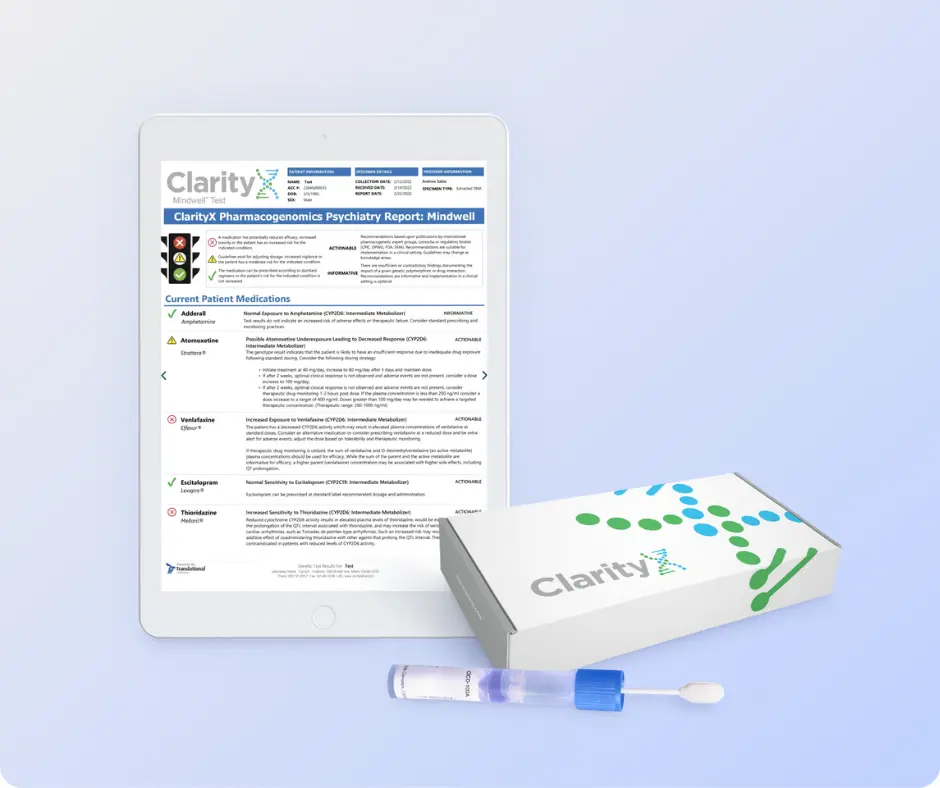It’s normal for your heart rate to escalate a bit after an exercise session or before a nerve-wracking event. However, if your heart rate seems irregular or rapid for no discernible reason, it may be indicative of a larger issue. Between 2.7 and 6.1 million Americans have atrial fibrillation, a serious condition characterized by an irregular heartbeat.
Between 2.7 and 6.1 million Americans have atrial fibrillation, a serious condition characterized by an irregular heartbeat.
While some cases of atrial fibrillation go away on their own, others escalate to even bigger heart problems. The good news is, there are treatments — however, it can be difficult to select the right medication. If you are prescribed the wrong medication you may wind up with debilitating side effects that defeat the whole purpose of treatment. At ClarityX, we offer DNA testing to help identify the best medication possible based on your genetic profile.
What Is Atrial Fibrillation?
Atrial fibrillation is defined as an irregular, rapid heartbeat in which the atria (the two upper chambers of the heart) are not in sync with the ventricles (the two lower chambers of the heart). While the exact cause is unknown, atrial fibrillation is typically linked to things like high blood pressure, heart valve disease, and obesity. Symptoms include:
- Heart palpitations
- Shortness of breath
- Fatigue and weakness
- Chest pain
- Dizziness
There are different variations of atrial fibrillation, with some people experiencing more intense symptoms than others.
What Types of Atrial Fibrillation Are There?
Most people deal with occasional atrial fibrillation, in which their heartbeat fluctuates between normal and irregular. Other versions of this condition include:
- Persistent atrial fibrillation: The irregular heartbeat lasts for over 7 days.
- Long-standing persistent atrial fibrillation: The heartbeat is abnormal for over 12 months.
- Permanent atrial fibrillation: The irregular heartbeat cannot be restored to normal.
If left untreated, atrial fibrillation can lead to problems like heart stroke, heart failure, and life-threatening blood clots.
What Treatments Are There For Atrial Fibrillation?
If you have occasional, persistent, or long-standing persistent atrial fibrillation, it’s important to visit your doctor and inquire about treatment. Generally, the treatment consists of the following:
- Cardioversion to reset your heart rhythm
- Medication to maintain the heart rhythm
- Medication to prevent other problems
The doctor will begin by resetting your heartbeat to normal through cardioversion, which can be done electronically or through drugs. Next, they will prescribe an anti-arrhythmic medication to help maintain this heartbeat. If necessary, your doctor will also prescribe drugs to prevent blood clots. This medication, known as atrial fibrillation anticoagulation, can reduce the risk of heart disease or stroke.
Although the general treatment procedure is more or less the same for each patient, the exact medication you receive differs for everybody. Most doctors begin with the trial and error method in which they prescribe a certain drug and then adjust if the patient reacts negatively — a process that is both time-consuming and taxing. Fortunately, genetic testing for atrial fibrillation offers a solution.
What Is Genetic Testing for Atrial Fibrillation?
Genetic testing for atrial fibrillation uses your genes to help figure out which medications may cause adverse effects. Genes are made up of deoxyribonucleic acid (DNA), a molecule consisting of sequences that are responsible for producing proteins. Think of DNA as a code — once the code is computed, a protein is created to carry out an essential bodily function.
Some of the most important proteins that DNA creates are enzymes, which are used to metabolize (or break down) medications. A small variation in your DNA’s code can affect the resulting enzyme, which in turn affects its ability to break down certain drugs. For example, a genetic variation in the CYP2C9 and VKORC1 genes can make it difficult to metabolize Warfarin (a type of atrial fibrillation anticoagulation) — if you have this variation and take Warfarin, the drug may remain in your body, and cause harmful side effects. Knowing about your genetic variations ahead of time can reduce the risk of taking medications that do more harm than good.
Do I Need Genetic Testing for Atrial Fibrillation?
Genetic testing can benefit anyone, from those concerned about their heart health to people that have already been diagnosed. You should consider DNA testing if you meet any of the following conditions:
- You are experiencing symptoms of atrial fibrillation (or other heart conditions)
- You or your relatives have a history of negative reactions to medication
- You have atrial fibrillation and your current medication isn’t working for you
- You have an underlying medical condition in addition to atrial fibrillation
It’s important to note that genetic testing cannot pinpoint every single variation you may have in your DNA. This testing usually focuses on a specific type of enzyme called cytochrome P450 (CYP450), which impacts the metabolism of over 70% of clinically used drugs.
Get A DNA Test for Atrial Fibrillation Today!
At ClarityX, we offer MaxRx a comprehensive genetic test to pinpoint these variations and help you narrow down your treatment options. Our MaxRx test can predict your response to several types of cardiac medications, including:
- Anticoagulant medications
- Antiarrhythmic drugs
- Antiplatelet agents
The process can be completed through a simple, at-home saliva test. Just one swab can give you key information about your DNA that will influence your treatment choices. Whether your current medication is giving you problems or you just want to be prepared for the future, we’re here to help. Get started with a DNA test today!





